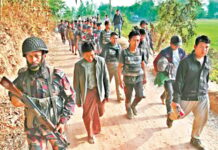Rejecting the defence review plea seeking discharge of detained Maulana Abdus Sobhan of Pabna, a top leader of Jamaat-e-Islami, from his alleged war crimes offences, the International Crimes Tribunal-1 on Thursday transferred the case to the Tribunal-2 for commencing trial.
After hearing arguments and counter arguments from both the defence and the prosecution lawyers, the three-member tribunal, headed by Justice M Enayetur Rahim, passed the order.
Moving the review plea over indictment against his client, defence counsel Shahjahan Kabir said none of the nine charges made against Maulana Sobhan was in line with the International covenant on war crimes.
Besides, the charges were not specific and were ‘vague’ having no minimum ingredient with back up support by pertinent documents, the defence counsel told the tribunal referring to section 16 of the International Crimes (Tribunals) Act 1973.
Referring to the defence counsel’s own investigation findings, Shahjahan Kabir told the tribunal that Maulana Sobhan ‘in fact’ had helped the struggling freedom fighters against the Pakistan occupation forces through the formation of Peace Committee in Pabna during the Liberation War in 1971.
Members of the peace committee as mole had collaborated with the freedom fighters during their operation, claimed the defence counsel, adding that as a result, many lives had been saved from the combating occupation forces.
Dismissing the defence arguments, designated prosecutor Tapas Kanti Baul said the war crimes charges had been made specifically with the evidence, including documents. Elaborate narration had been given as to how accused Sobhan picked up persons from the mosque and got them killed.
Prosecutor Tapas said all requirements prescribed in section 16 of the ICT Act 1973 had been exhausted in preparing the formal charge for which the tribunal found prima facie case for bringing the accused to justice.
“It’s is not possible to come to a decision on allowing the defence plea at this stage without trial,” argued the prosecutor.
On September 19 last year, after perusing the formal charge along with relevant statements and documents submitted by the prosecution, the tribunal took cognisance of the charges against Maulana Sobhan as it found a strong prima facie case against the accused under sections 3(2), 4(1) and 4(2) of the International Crimes (Tribunals) Act 1973.
On September 20, 2012, Sobhan, the number three man in the Jamaat-e-Ialami hierarchy, was held by the members of an army intelligence agency at Bangabandhu Bridge toll plaza in Tangail in connection with a case of violence. Later, the accused was handed over to the police.
The tribunal, upon a prosecution plea, had shown Sobhan arrested in connection with the case of the 1971 crimes against humanity.
According to the prosecution, it received allegations like genocide, rape, arson and looting perpetrated by Sobhan, the then leader of Pabna Peace Committee (collaborator) and Pabna district Jamaat ameer, in collaboration with Pakistan occupation forces, including Razakar, Al Badr and Al Shams, during the Liberation War.
Sobhan had allegedly played a key role in organising Razakar, Al Badr and Al Shams, the auxiliary forces of the Pakistani junta, in Pabna district.
Source: UNBconnect










